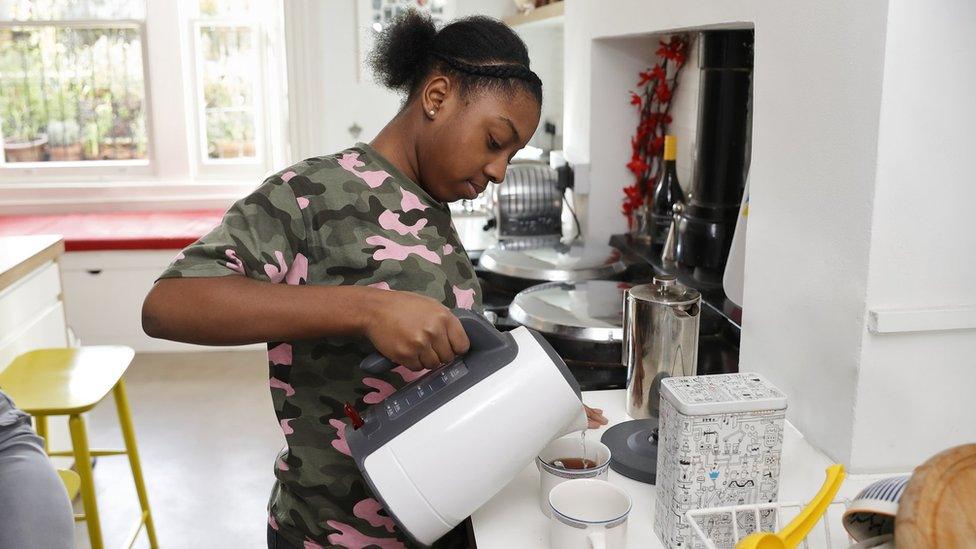Cost of a cup of tea rising as food prices jump
- Published

The cost of making a cup of tea went up significantly as food prices continued to rise at record rates in October, a retail trade body has said.
Costs for tea bags, milk and sugar all rose as food price inflation jumped from 10.6% last month to 11.6%, according to the British Retail Consortium.
The hike in shop prices was partly due to higher costs for ingredients and energy.
Worker shortages also pushed up prices.
The war in Ukraine has seen energy and food prices around the world increase. The conflict has disrupted supplies from both Russia and Ukraine, which are major exporters of goods such as sunflower oil, wheat, and fertiliser.
And with oil and gas prices at high levels, businesses are having to pay more to transport produce due to higher fuel costs. Worker shortages have also contributed to higher wages for some, such as lorry drivers, adding to employers' wage bills.
'Humble cuppa'
Helen Dickinson, chief executive of the British Retail Consortium, said October had been a "difficult month" for customers, who had not only faced an increase in energy bills, "but also a more expensive shopping basket".
"Even the price of basic items went up, with the price of the humble cuppa rising, as tea bags, milk and sugar all saw significant rises," she said.
"With Christmas fast approaching, customers are looking for any sign of respite, but it is increasingly difficult for retailers to shoulder the ongoing supply chain pressures."
These price rises are tracked using a figure called the inflation rate - a measure of the increase in the price of something over time.
For example, if a loaf of bread costs £1 and it goes up to £1.05 a year later, then bread inflation is 5%.
Latest figures for the BRC-Nielsen IQ index show fresh food inflation accelerated in October to 13.3%, up from 12.1% in September, which is the highest rate on record for the food category.
Andy Clarke, the former chief executive of Asda, told the BBC's Today programme that retailers were already seeing customers starting to buy less as a result.
He added that price rises were unlikely to slow down very quickly over the next few months.
"It's going to be a tough winter and food inflation is clearly just adding to the burden of families," he said.
"For retailers, they're doing everything they can, as are manufacturers, trying to find ways of reducing costs…but I think what we're seeing is with everything they're doing, they can't protect the consumer as much as they'd like to."
Ms Dickinson suggested the government could step in to curb food price rises by freezing business rates, which she argued would prevent "an additional £800m bill landing on the plates of retailers and in turn their customers in 2023".
A statement from the Treasury said the government's review of business rates had let to "almost £7bn of support to reduce the burden of rates" for businesses over the next five years.
It added reforms had been brought forward to "make the system fairer, including further business rates relief, freezing the multiplier in 2022-23 to put the brakes on bill increases, and more frequent revaluations".
Overall inflation - the rate at which UK prices rise - surged to 10.1% in September and is expected to climb further.
Experts have said the high inflation will put pressure on the Bank of England to hike interest rates and it is widely expected to bring the base rate to 3% at its next meeting on Thursday.
By raising rates, the Bank aims to encourage people to save more and spend less, in the hope this will stop prices rising as fast. It has increased rates seven times in a row since December as it tries to bring inflation back down to its 2% target.
But higher rates also drive up borrowing costs for mortgage holders and businesses, and experts warn this could put a brake on economic growth.

Find out why food prices are also on the rise.
Watch now on BBC iPlayer (UK only).


How is the rising price of food affecting you? Do you have any money saving tips or food hacks that you would like to share? Email haveyoursay@bbc.co.uk, external.
Please include a contact number if you are willing to speak to a BBC journalist. You can also get in touch in the following ways:
WhatsApp: +44 7756 165803
Tweet: @BBC_HaveYourSay, external
Please read our terms & conditions and privacy policy
If you are reading this page and can't see the form you will need to visit the mobile version of the BBC website to submit your question or comment or you can email us at HaveYourSay@bbc.co.uk, external. Please include your name, age and location with any submission.
